Sunday, April 06, 2003
POPPIES
Mike recently posted a picture of a defaced British war cemetery in France. Rather than anger, I feel sorrow for the people that did this. They either have no knowledge of history or are driven to desperation by who knows what.
Two years ago, my family (minus my wheelchair bound mother) travelled to Flanders to trace the footsteps of my grandfather. We are not the only people to do this. Every year thousands of Brits and a lesser number of Americans, Aussies and Kiwis, visit the battlefields and cemeteries of the First World War. It is a personal thing, but a little cottage industry has grown up around it.
I never knew my grandfather. He died when my dad was fairly young. He came from Scotland and early in life moved to England and worked in big houses looking after horses (equerry would probably be too high a job title for him). Within days of war being declared he joined the cavalry and was shipped out to France. From what little I can piece together he fought with the cavalry for a while but then moved to the Lancashire Fusiliers, presumably because most of the cavalry was being wiped out.
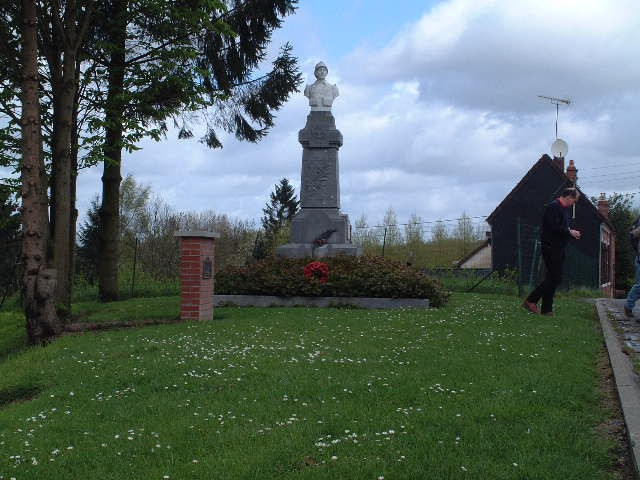
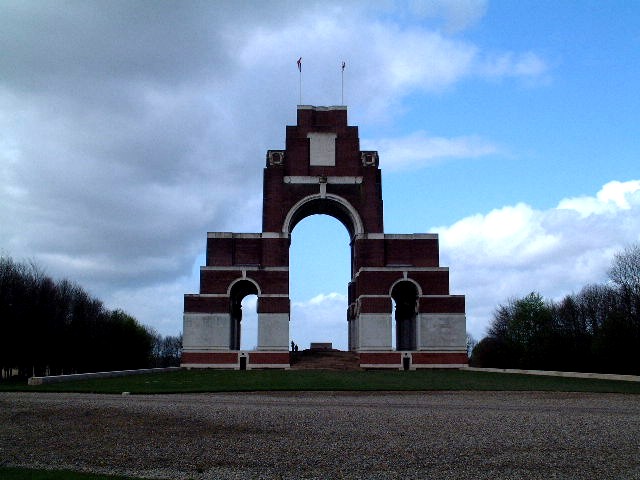
Lancashire Fusiliers Memorial, Antielle. Thiepval Memorial to the Missing
As he survived the early days, he was soon promoted. This has made it a bit easier to trace his steps. Unfortunately, we don't have letters and soldiers were discouraged from keeping diaries would they fall in to the wrong hands. But, my dad, brother and cousins have done a good job so that we have found the spot where he led a raid to capture a company of Germans, near Ypres in Belgium. He won a Military Cross for his actions. He later survived gassing, which blinded him temporarily. He was court martialled for drunkeness and demoted. He finally left the Army just a few months before conflict ended in November 1919.
Visiting the battlefields it is hard to imagine, 90 years on, that the area was riddled with trenches, minefields, barbed wire and hundreds of dead bodies. What is more poignant, but somewhat unreal, are the dozens of cemeteries scattered across the landscape, some out in the middle of fields, inaccessible unless you know what you are looking for. I found it deeply moving seeing the gravestones of so many young British men and those of our, at the time, Empire. These men, like my grandfather, thought they were doing the right thing. They thought they had god on their side; perhaps they thought the enemy were evil.
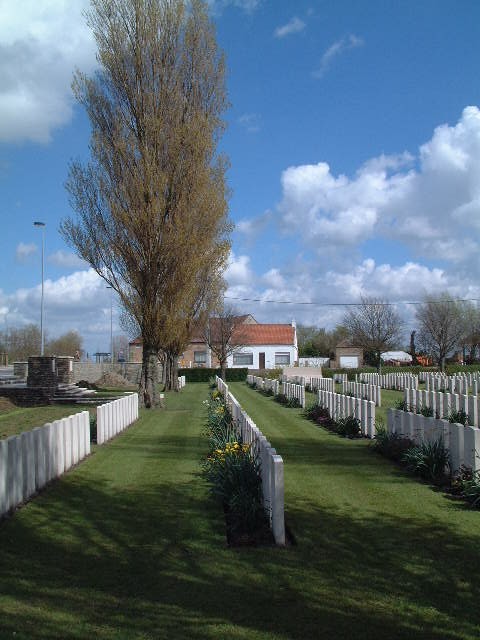
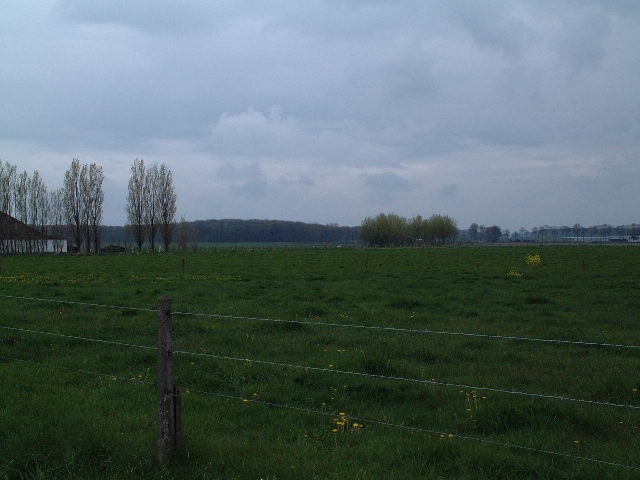
St Georges Cemetery. Houtholst Forest near Ypres
Of course, we know that the "war to end all wars" was not that. It was also not a "just" war. Europe was sucked in to a destructive conflict like none ever seen by stupidity, by greed, by lack of understanding, by fear. France, whose countrymen have now defaced a cemetery to British dead defending French soil, lost most of a generation.
Today, a vast majority of French people, the polls say, oppose the war in Iraq. The same is true across many countries in Europe including Germany, Belgium, Russia and Turkey - countries heavily involved in the First World War.
Those who support the war say that a pre-emptive strike is necessary because to do otherwise is appeasement of an evil regime which possesses weapons of mass destruction. Some have attempted to draw a parallel to the thirties when Germany was able to re-arm, in part because of a policy of appeasement by the likes of the UK and elsewhere. I don't subscribe to this logic as it applies to Iraq. So far, from the little evidence available, it seems that Iraq does still possess some chemical weapons. We will see, but my suspicion is that most of these were left over from after the '91 Gulf War. Iraq has been slow to disarm, no doubt about that. But, what nation willingly disarms? It also seems that Iraq does not possess the means to deliver chemical weapons to anywhere but the immediate battlefield.
As for nuclear capability, again it is probably too early to say. Saddam has, no doubt, always wanted nuclear capability because he does want to hold the balance of power in the region. He sees himself as a defender of Arabs against the infidel West and its agents in Israel.
The other evidence so far is that Iraq is no match in terms of technical ability and most of its army is made up of poorly trained, armed and paid conscripts eager to surrender as soon as the bombs start falling.
What of the link with terrorism, you ask? There are, without doubt, links between Iraq and terrorism. Saddam is proud to boast that Iraq rewards Arab suicide bombers. But, stop and ask whether it is Saddam's largesse or the desperate plight of Palestinian refugees that leads to suicide bombings? Al-Qaida? The US has provided evidence of links between Iraq and those who alledgedly organise the WTC/Pentagon massacres. I question whether Iraq is the catalyst for these attacks or, indeed, for any activity by Al-Qaida. Terrorist oragnisations probably operate out of Iraq and are tolerated by the regime. You could argue the same for Pakistan, India, Indonesia and many other countries around the world. And, don't forget who supported some of these idiots 20 odd years ago - our friends in the CIA, SIS, Mossad etc.
One web site has called me "un-American". If to question the justification for an expensive war which will lead to significant loss of life, threatens to damage our economy and will not (in my view) eradicate terrorism, then I am guilty. If it has anything to do with my love for the country and its generally warm, hard working people, then I hope you can see what bunkum that is. My gripe is with the leaders of the US and the UK, not the average Joe. I want to debate this issue because it is important for all our futures. I want to live in a safe and prosperous society. This war will, in my view, make the western world less safe. It threatens (and so does the continued terrorist threat) our prosperity. I look for an inclusive world for all.
It brings me back to the fields of Flanders. I've seen some of the evidence of the waste that war brings. In the case of WWI, unnecessary waste. Europe and the world was engulfed just 20 years later in more carnage. The Cold War and the later Balkan crisis my, in future, be seen as the final chapter in that European Civil War.
The current conflict in Iraq should be seen as part of a 20 year war in the region - between Iraq and Iran (sponsored by those good folks in the White House), then Iraq, Kuwait and the West. It is part of the wider Middle East crisis. At this point, I feel that resoltuoin of the situation to the west of Baghdad - ie in Palestine - is more important. Resolve that crisis and the region will stabilise. Saddam, in 2003, is not the destabilising force in the region that he was in 1991. Where is the evidence tha he is? If we had allowed the weapons inspectors to do their work (and if Saddam had too), we might have blown away that line of thought. Then again it may have proved the US/UK line. I may be wrong. Let's wait and see.
Meanwhile, I cannot help but think of those desecrated memorials in France, the bombed out buildings of Baghdad, the population of Basra lacking clean water, those who now have another excuse for jihad and think how to mend the damage.
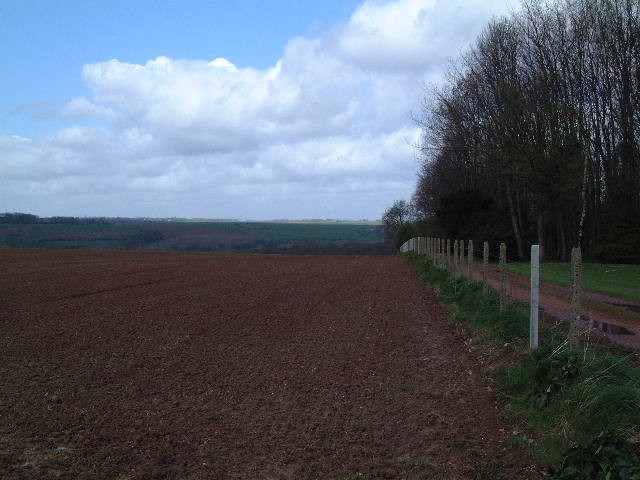
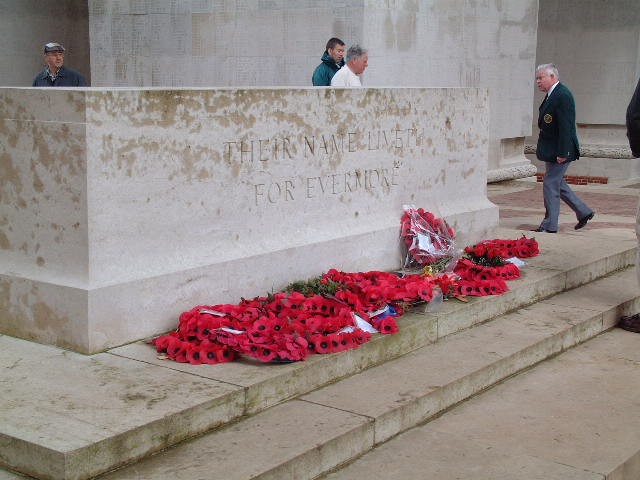
A field in the Somme. Thiepval Memorial to the Missing







 :: Posted by pete @
:: Posted by pete @
Read or Post a Comment
<< Home